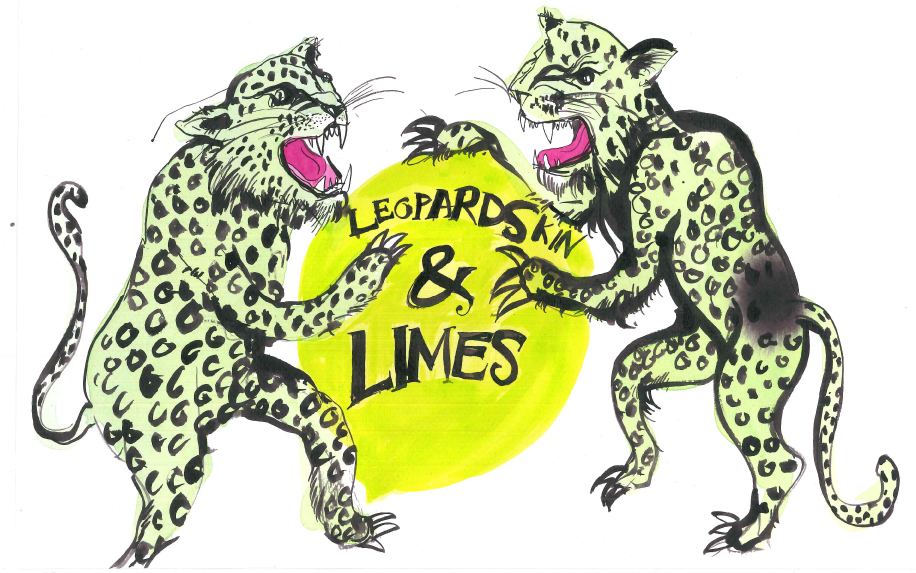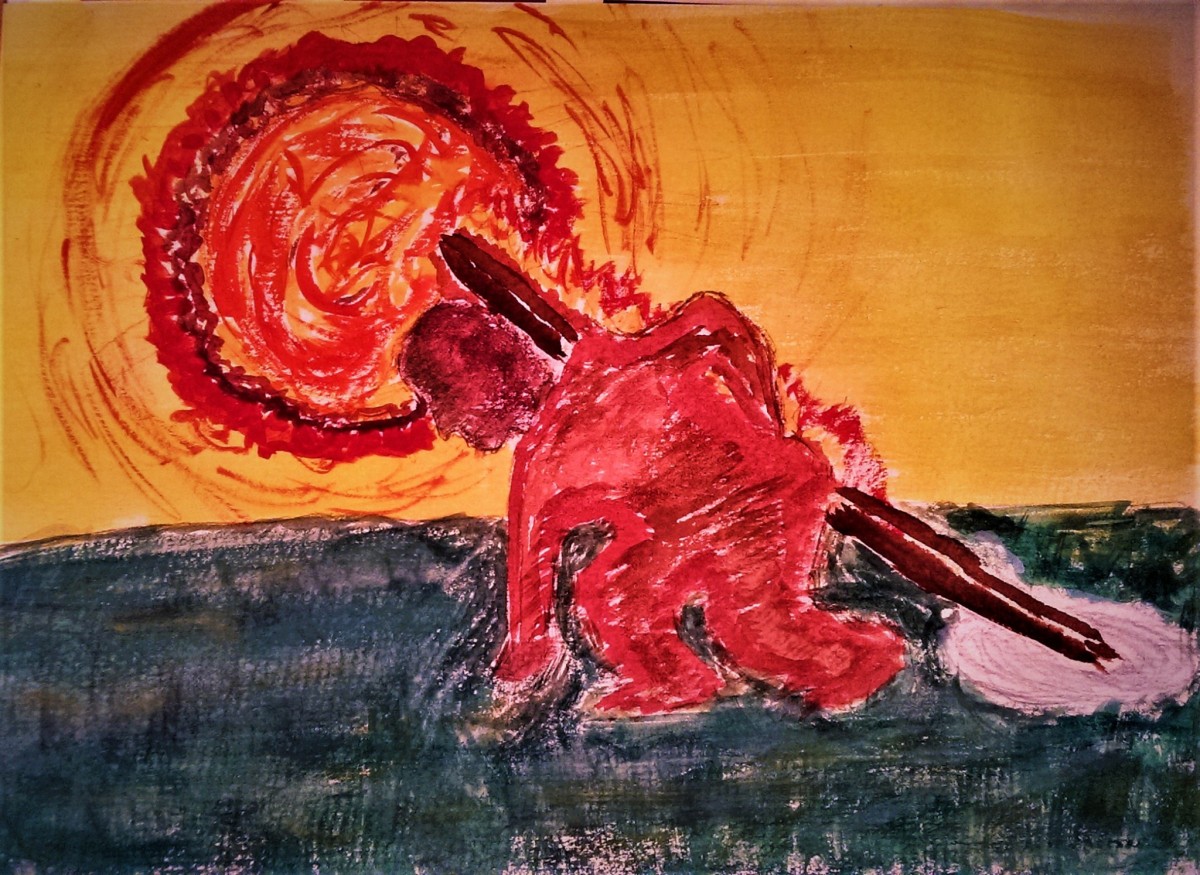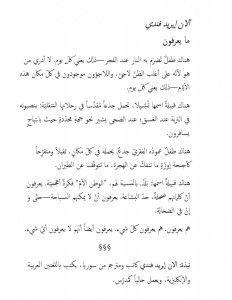Image © Alan Irid Fendi 2017
| by Alan Irid Fendi | July 11, 2017 |
There’s a boy set aflame when the sun comes up—that means everyday. I don’t know who he is because he’s probably a refugee. And refugees are everywhere these days—that means everyday.
There’s a tribe called Tjipla that carries a sacred pole on its nomadic journeys; they erect it in the soil at dusk; at noon it points in a certain direction wherein they gladly travel.
There’s a boy with a pole for a backbone; he bears it everywhere. And it’s hefty and sore like the wings of a goose that can’t stop to migrate, can’t quit to soar.
There’s a tribe called Country. For them, Motherland is a foreign thought. They know their words are gravely shallow. They know they can’t swim—no matter how shallow.
They know. They know it all. They know they don’t know anything at all.
Jane Flett Interviews Alan Irid Fendi
Alan, thanks so much for agreeing to talk to us about your poem and experiences as a Syrian poet and refugee. We really love this poem and are thrilled to be publishing it in L&L.
I’m absolutely overjoyed my poem found a home, really quickly, in L&L! Plus that I am thankful for the opportunity to be talking to your journal about me and my work. And it truly warms my heart to know that there exists someone that is so passionate about a poem that’s not theirs.
Do you want to tell us a bit about your background as a poet and refugee, and how you came to be in Norway?
Technically speaking, I should’ve never been a poet. What I should have become is what my college friends are now: A doctor—fixing people and prescribing remedies for their pains, which is sort of what poets do. Albeit, sometimes they do the opposite.
I was forced, due to war-wrought circumstances, to drop out of my university and put my studies on hold. It was after that that I seriously started looking at myself in the mirror and vaguely seeing: A poet. Of some sort.
I had naturally read loads of poetry through the various stages of school—curiously, our Arabic textbooks taught us nearly only poetry when it came to literature—but it hardly ever resonated with me. (Obligation never brings about fascination, I suppose.) And I remember that one of the very few poems I really adored from school textbooks was one written by Syrian poet Abdul Basit Alsufi. They said from the dawn’s shirt we stole a flirtatious napkin/ And our town burnt like a glint of embrace and kisses. (Which I created melody for and sang avidly during my overlong study hours.)
My guess is that I began writing poetry when I realized that the school’s way wasn’t the one and only way to use words, and that I had feelings and thoughts that raged about and demanded that they be given vent to. I, who in essence isn’t someone who’s “smart & handy” with language, always considered that words are not supposed to be formulaic, pre-destined, or dull! And of course all the moving around, and experiences have nurtured my then, and likely still, under-developed vision and outlook. I have undergone a lot throughout the course of my life, and I like to think of myself as a well-advised and sharp individual. Hard-working, too. Even when I’m being a lazybones.
My life as a refugee (the part I possess no enthusiasm for telling about anymore) began 4 years ago. First I settled down for less than 2 years in Egypt, and, then, hopeless and frightened, I decided to depart again and move to Europe, and so I chose to come here, to “the happiest and most tolerant” of countries, to Norway. Life here staggers you immediately, or gradually, depending on how much you already know about the dissimilarities between Western societies and those in the Mid-East. Nobody ever tells you, however, that life here would be insecure, in a completely unusual manner to that of your past life. On the periphery, no-one ever mentions bigotry; the stigma linked to asylum-seekers; how you’ll be half of the time looked at as a subhuman, or in the least given the stinky eye on the street; how just because you’re a foreigner, your speech, even though clear after years of try-and-error, still sounds like incomprehensible gibberish.
What was the inspiration behind this poem?
A refugee kid in Lebanon was severely burnt when he ran out of fuel for his motorbike and stole enough for his ride from another bike parked outside its owner’s house. Upon seeing that, two young thugs living in that neighbourhood came to be the vicious criminals.
By now, the boy in this poem is likely forgotten by everyone else but his close family. I myself had forgotten him for nearly a month before jotting this loosely documentary piece down.
This poem speaks of the lost, jumbled identity every Syrian is plagued of these days. None of us knows who they genuinely are any longer. One and whole or just nothing? Religious or anti-religion? Freedom fighters or freedom-fighters? Opportunists? Separationists? Saviours? Killers? Mistresses for Misery? Self-despisers might be the most accurate description I can emblazon us with.
This poem talks also about the blindness which a group of people is willing to adopt in order to stay in one piece. Of the way most people in the Middle East are approaching the modern world. Of how it should invariably not be unacceptable to admit one’s own wrongdoings and shortcomings, for who are we if we don’t acknowledge what we’re not?
Yet, because this must be said as well, drowned in all my cynicism and nihilism, there are various specks of hope sparkling in the air. I can see them, and I’m surprisingly optimistic. Not about the near future, though, but about the real one, which is yet to arrive.
We’re super excited to publish your poem in both English and Arabic. What are the differences you find writing in these languages? How do you decide which to write in?
I would’ve loved to answer concisely by quoting Chekhov, but that would be too miserly of me. But anyway here’s what he said in a letter to Dmitri Grigorovich: “The saying about chasing two hares at once has never robbed anybody of more sleep than it has me.” (Chekhov was a practicing physician while he simultaneously lay with his mistress: Literature. I, on the other side of the highway, do more, or so I think. I teach Norwegian at a secondary school to foreign students, and I write both in Arabic and English, plus translation.) And my reaction to that is: How fitting! In Syria, we say: “I have no time to scratch my arse.” And that’s namely my case.
I do not often decide, at least consciously, which language to write in. However, it happens sometimes that I do purposefully prefer one over the other. The other day it struck me that all the fiction I’d written so far had been in English. So, like that, I decided to get a go at an Arabic short story. And to let you in on a lovely secret: I haven’t finished that yet.
My personal feeling about this dilemma is that English is easier for conveying almost anything as long as it’s not deeply rooted in Arabic-related culture, lore or idiosyncrasies; while Arabic can be great if I wish to sound wise, preach, or relate a 21st century epic. A poem in English can be melodic in its own distinct, innovative way; whereas, in Arabic, I feel my choices are limited, perhaps, or it could just be me who’s not capable of toying with the music of my own language. (Always trying to innovate, though.) English can be far more immediate and specific. Arabic is sometimes simple, sombre, or too old-fashioned—so it kind of depends on the nature of the verse you’re writing and whether this one language fits the style or not. In a recent poetic experiment, I have composed a poem in 3 different languages (Arabic, English and Norwegian); that poem will never see the light of day. I’m sure about that.
Writing in Arabic can hinder me since it’s a ridiculously traditional language; e.g. it’s ill-advised to use everyday words because those ones are not literary, and using them diminishes the sturdiness of a text, especially in poetry. Whereas in English, you have broader leeway to write in the preferred manner of your choice. Common and informal expressions aren’t a problem because they’re equally used in everyday life alongside the more formal ones. In Arabic, however, there’s a barrier between the two: the formal and sophisticated vs. the vulgar and commonplace. Another characteristic of Arabic lit is how it strangely does not depend on, and seldom employ, some literal devices and techniques like allusion, internal rhyme, an expansive world-view, complexity and richness, wordplay, and HUMOUR!, for goodness’ sake! Or even proper , punctuation, for . double? goodness’ sake!
After all this bashing, I have to confess that I love Arabic and experimenting with the Arabic poem, in matter of context, form, tone, narrative and avant-gardism. And I will most probably never give up writing in Arabic.
What about the process of translation—how does that work for you?
It’s a mess! I usually have 3 or 4 types of dictionaries and thesauruses ready to be rummaged through. It takes a lot of time, and it drains away the energy on some occasions. But it’s fun, and intellectually enriching. I find myself at all times learning new words, expressions and facts in both languages. Especially in Arabic.
Translating What They Know, which was born in English, into Arabic proved hard; normally, when translating in the opposite direction (from Arabic to English) I am satisfied in such a shorter time compared to what it took me for this one. It was indeed challenging, and I don’t know how to explain this, but the Arabic What They Know reads conspicuously as a translated poem. Consolingly, though, translated works always sound ”translated” in Arabic. You can hear them in your head read as subtitled foreign movies.
And of course you’ve got other challenges, sometimes relentless ones. One example I can give is: in one short story that I have written not long ago, I address the issue of knowing very little about what certain trees are called. There are thousands of different types of trees. In Arabic you can simply call any of them: That tree! (It’s not because we don’t have names for them. We do. It’s rather that they sound foul, obsolete or pompous.) It’s frustrating, indeed, and sad that having the knowledge to name things is somehow frowned-upon in Arabic-speaking societies.
Another, rather funny example is that recently I have, for the first time, been into translating other poets’ work, and not just mine. (Coincidentally, altruism is a word I have learnt not long ago.) I had W. B. Yeats’ the Dawn, and there was this line: Above the cloudy shoulders of the horses. In Arabic, adjectives always follow their nouns, as is the case in French, and it can absolutely muddle up whole and squeaky-clean sentiments and images. The quirky, yet slightly disastrous, outcome I had was (re-translated into English): Above the cloudy horses’ shoulders. And I protested in vain to myself, “Now the horses are entirely cloudy!” And that’s the only way to go about it.
I have, in addition to translating Yeats, done translations of a few other poets: W. S. Merwin, Clarence Major, Wang Wei, Sandra Simonds. And I will be translating a number of essays by Eliot Weinberger. (I first read about this Tjipla tribe, the one mentioned in the poem, in one of his essays.) I just have to find the time to do that. There’s really not enough time in the world.
Can you recommend some poets you like?
These names are by no means recommendations, and equally enough not a favourites list. I just happen to remember them somehow—another secret: I believe I suffer from undetectable, early-age dementia—or to have read them recently and enjoyed what they offered me as a humble reader.
Arabic: Suzan Alewan, Mohammed Almaghout, Amal Danqal, Ahmad M. Ahmad, Mamdouh Odwan, Samia Sasi, Ismail Ibrahim Alkhalaf, Golan Haji, Mohammad Eid Ibrahim, Josef Harb, Adonis, Badr Shakir Assayyab.
English: Charles Harper Webb, Clarence Major, Miho Nonaka, Carrie Shipers, Andrea Cohen, C.D. Wright, Kaveh Akbar, Kwame Dawes, Claudia Keelan, Ye Chun, Claudine Toutoungi, Clare Rossini, Emily Geminder, Adam Latham, Nathaniel Perry, Philip Metres, Saddiq Dzukogi.
Nowregian: Hild Borchgrevink, Silje Vethal. I must say “sorry” here.
It’s obvious to me that my reads are mostly English, which is undisputedly a double-edged phenomenon. On this hand, I am slowly drifting away from my mother tongue, and so rendering me therein socially and creatively useless; on the other, I feel I’m evolving, as a person and a writer at the same time, in a way I wouldn’t have dreamt of if I were to be cocooned and cradled safely, unwittingly and intentionally, in the abysmal current state of Arabic, literal and non-literal mentality.
One thing I know for certain, certain as I am of my existence and surroundings, is that one day I will be ashamed to have said all of this, and try, desperately, to refute it, un-say it. Another thing is how disheartening it is that, after all my fruitless attempts to be heard in my mother language, through Arab literary channels, I have yet to succeed.
Nonetheless, you shouldn’t despair, Arab writer, or any writer for that matter!
__________
Alan Irid Fendi is a Syrian poet of 24 years, and a refugee of 5 years. Since 2015 he has been living in a European country where light is slight, and rain loves to be around. He works as a secondary-school teacher of the language of that country, plus all the other subjects in the curriculum. You can read his poem Chemical Air at the New Verse News magazine.


